Newfoundland Dogs The Gentle Giant of the Canine World
Newfoundland Dogs The Gentle Giant of the Canine World , are loyal and caring. The Newfoundland dog, often called a gentle giant, is a remarkable breed known for its size, strength, and sweet-natured temperament. With its impressive appearance and exceptional swimming abilities, Newfoundland has gained popularity worldwide. We will explore the fascinating characteristics, history, care, and other intriguing aspects of the Newfoundland dog. So, let’s dive in and discover everything you need to know about this beloved breed.
Q1: What is a Newfoundland dog?
A Newfoundland dog is a large working breed that originated in Newfoundland, Canada. They are renowned for their size, strength, and thick, water-resistant coats, which make them excellent swimmers. These gentle giants have a calm and patient demeanour, making them ideal family pets.
Q2: How big do Newfoundland dogs get?
Newfoundland dogs are among the most giant dog breeds. Adult males typically weigh between 130 and 160 pounds, while females range between 100 and 130 pounds. They can reach a height of 26 to 30 inches at the shoulder.
Q3: What is the history of the Newfoundland dog?
The Newfoundland dog breed has a long history rooted in Newfoundland, Canada. Fishermen initially used them for various tasks, including hauling nets, retrieving fishing gear, and rescuing people from the water. Their webbed-like feet and excellent swimming abilities made them invaluable in these tasks.
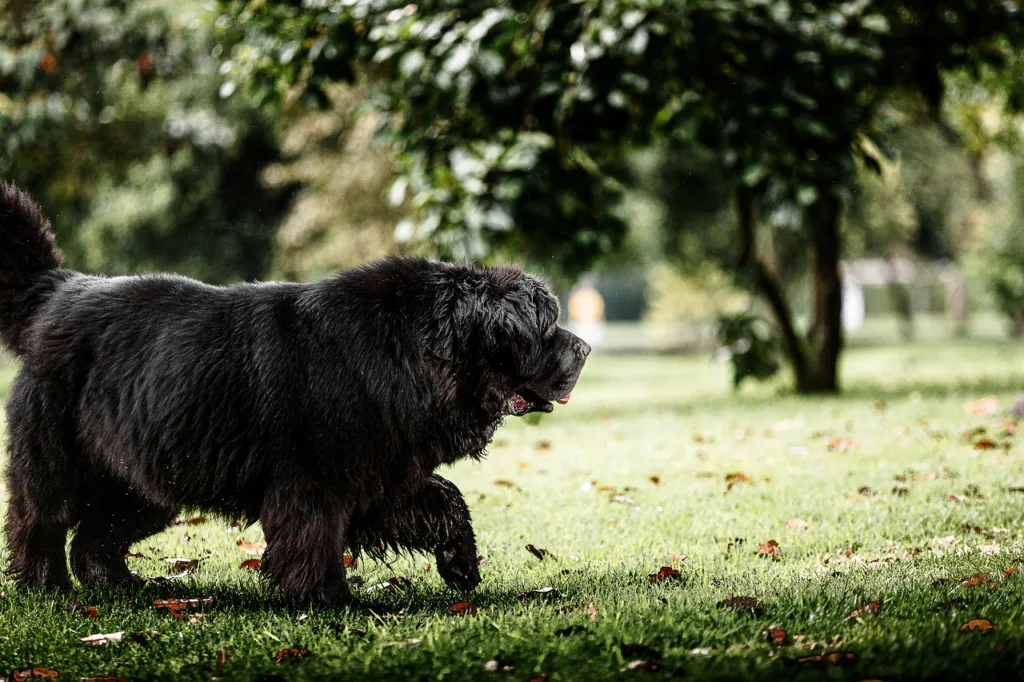
Q4: Are Newfoundland dogs good with children?
Yes, Newfoundland dogs are known for their gentle and patient nature, making them excellent companions for children. They are generally tolerant and protective of their family members, especially young ones. However, as with any dog breed, supervision and proper socialization are essential.
Q5: Are Newfoundland dogs good swimmers?
Newfoundland dogs are exceptional swimmers. Their large lung capacity, muscular build, and webbed-like feet allow them to swim effortlessly. They are often used in water rescue operations due to their strength and natural swimming abilities.
Q6: What is the Newfoundland dog’s coat like?
The Newfoundland dog has a thick coat designed to protect them in cold water. The outer skin is coarse and dense, while the undercoat is soft and insulating. This coat requires regular brushing to prevent matting and maintain its health and appearance. Try the Maxpower Planet Pet Grooming Brush – Double-Sided Shedding and Dematting Undercoat Rake Comb for Dogs.
Q7: Do Newfoundland dogs drool a lot?
Yes, Newfoundland dogs are known to be heavy droolers. The loose skin around their jowls contributes to their drooling tendencies. If you are considering owning a Newfoundland dog, be prepared for some drool management.
Q8: Are Newfoundland dogs easy to train?
Newfoundland dogs are intelligent dogs and generally eager to please their owners. However, they can have an independent streak, so consistent and patient training methods are necessary. Early socialization and positive reinforcement techniques work best with this breed.
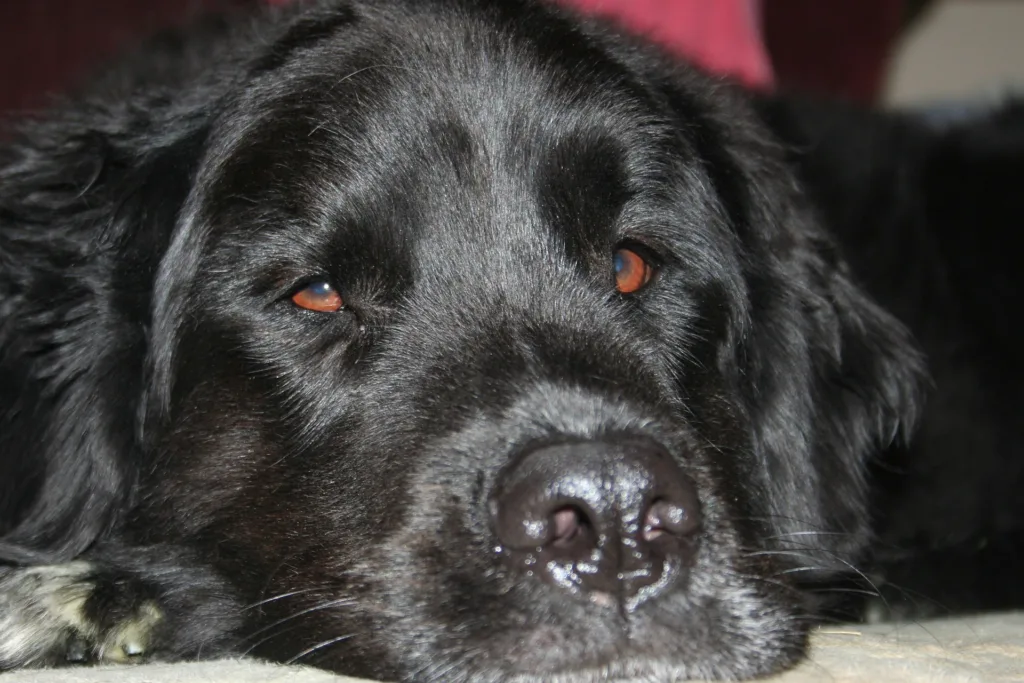
Q9: How much exercise do Newfoundland dogs need?
Despite their large size, Newfoundland dogs have a moderate exercise requirement. They enjoy daily walks and benefit from regular mental stimulation. They are moderately energetic but need opportunities to stretch their legs and engage in appropriate activities.
Q10: Do Newfoundland dogs have any health issues?
Like all dog breeds, Newfoundland dogs have some potential health concerns. These may include hip and elbow dysplasia, heart conditions, and certain genetic disorders. Responsible breeders perform health screenings to minimize the risk of these issues.
Q11: How long do Newfoundland dogs live?
On average, Newfoundland dogs have a lifespan of 8 to 16 years. Providing them with proper care, including a balanced diet, regular exercise, and routine veterinary check-ups, can help maximize their longevity.
Q12: Do Newfoundland dogs shed a lot?
Yes, Newfoundland dogs are moderate to heavy shedders. Their thick double coat sheds seasonally, with more significant shedding occurring in the spring and fall. Regular brushing can help manage the shedding and keep their coat healthy. Try the Maxpower Planet Pet Grooming Brush – Double-Sided Shedding and Dematting Undercoat Rake Comb for Dogs.
Q13: Are Newfoundland dogs good guard dogs?
Newfoundlands may not be natural guard dogs due to their friendly and gentle nature. However, their large size and deep bark can act as a deterrent to potential intruders. They are likelier to welcome guests with wagging tails than to exhibit aggressive behaviour.
Q14: Can Newfoundland dogs live in apartments?
Newfoundland dogs are large dogs and require ample space to move around comfortably. While they can adapt to apartment living if given sufficient exercise and mental stimulation, they are better suited to homes with access to a secure yard or open space.
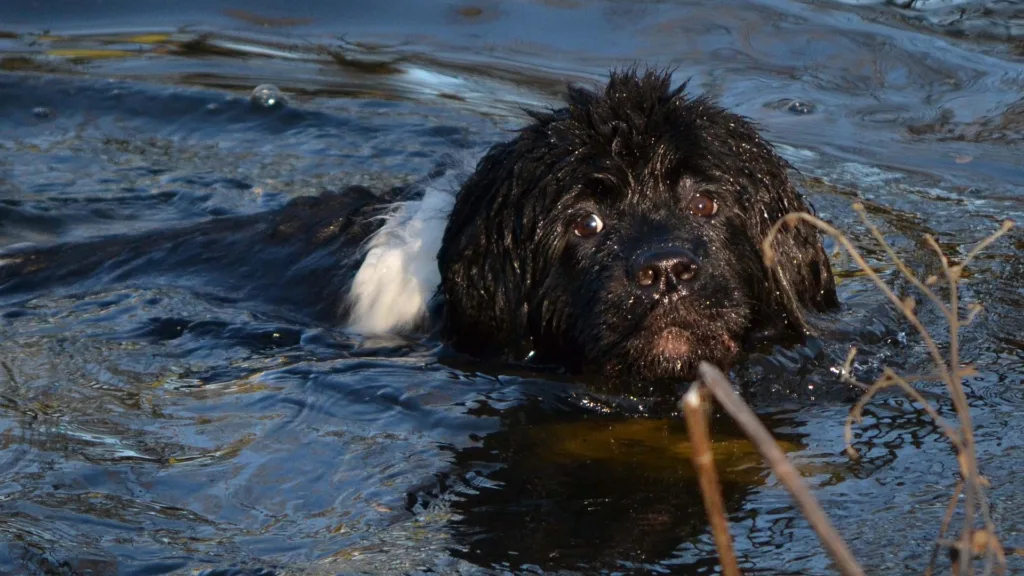
Q15: Do Newfoundland dogs get along well with other pets?
Generally, Newfoundland dogs are known to be friendly and accepting of other pets, including cats and smaller animals. Early socialization and proper introductions are crucial to ensure positive relationships among different animals in the household.
6 Newfoundland and Labrador Travel Guides.
- 15 Destinations For The Most Family Fun In Newfoundland.
- The Best Hotels In St. John’s Newfoundland For Your Stay.
- The best 11 Newfoundland destinations for families to travel.
- 12 Of The Best Beaches In Newfoundland To Visit.
- 10 Surprising Places To See This Summer In Newfoundland.
- The Best Memorable Tourist Things To Do In Newfoundland Now.
Q16: How often should I groom my Newfoundland dog?
Regular grooming is essential for Newfoundland dog coat health. Brushing their coat at least once or twice a week helps prevent matting and removes loose hair. Their ears should be checked and cleaned regularly, and their nails trimmed as needed.
Q17: Can Newfoundland dogs tolerate cold weather?
Newfoundland dogs have a double coat that provides excellent insulation, making them well-suited to cold weather. The Newfoundland dog thrives in cooler climates.
Q18: Can Newfoundland dogs tolerate hot weather?
Due to their heavy coat and large size, Newfoundland dogs are prone to heat exhaustion and heatstroke in hot and humid weather. It is crucial to provide them with plenty of shade and fresh water and avoid vigorous exercise during peak temperatures.
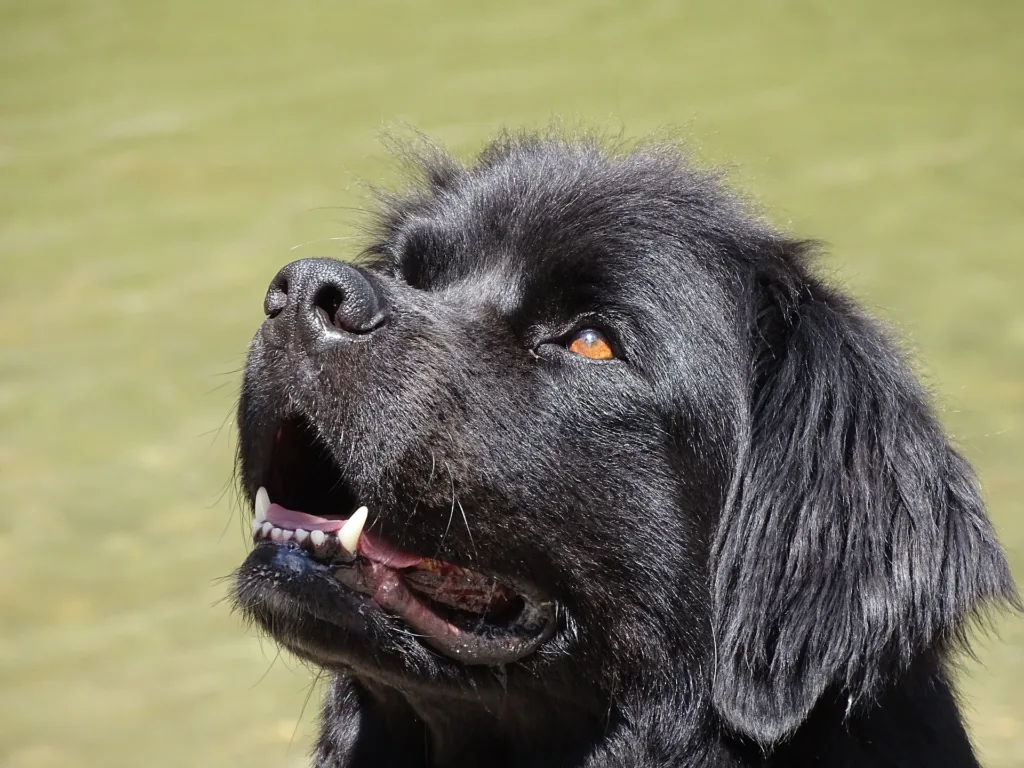
Q19: Are Newfoundland dogs good therapy dogs?
Newfoundland dogs are often employed as therapy dogs due to their gentle and calm nature. They have a natural affinity for comforting and providing emotional support to those in need, making them excellent candidates for therapy work.
Q20: Are Newfoundland dogs good for first-time dog owners?
Newfoundland dogs can be suitable for first-time dog owners, provided they are committed to the responsibilities of owning a large breed. Early training, socialization, and understanding of their exercise and grooming needs are crucial for a successful experience.
Q21: Can Newfoundland dogs be left alone for long periods?
Newfoundland dogs thrive on companionship and are known to be family-oriented. Leaving them alone for extended periods can lead to separation anxiety and destructive behaviour. It is recommended to provide regular exercise and mental stimulation and avoid leaving them alone for too long.
Q22: Do Newfoundland dogs require a specific diet?
Newfoundland dogs tend to gain weight, so a balanced diet is crucial to maintaining health. Feeding them high-quality dog food suitable for their age, size, and activity level while monitoring their calorie intake is essential to prevent obesity.
Q23: Can Newfoundland dogs participate in dog sports?
While they may not be the most agile breed, Newfoundland dogs can participate in various dog sports and activities. They excel in water-based activities like water rescue and swimming competitions. They can also participate in obedience, tracking, and cart-pulling events.
Q24: Are Newfoundland dogs prone to droopy eyes?
Newfoundland dogs have a kind and expressive look, which may sometimes give the impression of droopy eyes. However, they do not have an inherent issue with drooping eyes or excessive skin sagging around the eye area.
Q25: Do Newfoundland dogs require special training for water rescue?
Newfoundland dogs have an instinct and ability for water rescue. While formal training programs are available, they often display a remarkable aptitude for water rescue tasks without extensive training. However, professional guidance can enhance their skills and ensure safety.
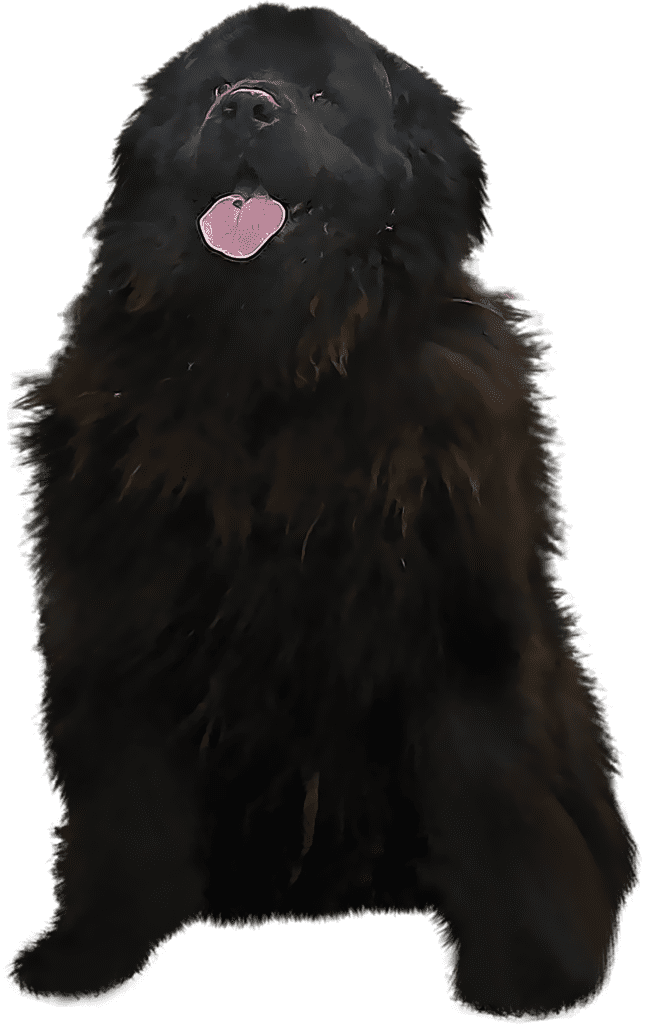
Q26: Can Newfoundland dogs adapt well to different climates?
Newfoundlands are adaptable to different climates but better suited to cooler regions due to their thick coats. Adequate shelter, access to water, and temperature monitoring are crucial when keeping them in warmer climates.
Q27: Are Newfoundland dogs good swimmers in rough water?
Newfoundland dogs are exceptional swimmers and are capable of navigating rough water conditions. Their strong swimming abilities, webbed feet, and muscular build make them well-suited for water rescue and working in challenging aquatic environments.
Q28: Can Newfoundland dogs be trained for search and rescue operations?
Newfoundland dogs are trainable for search and rescue operations, particularly in water-related scenarios. Their strength, swimming abilities, and keen sense of smell make them valuable assets in locating and assisting distressed individuals.
Q29: Are Newfoundland dogs prone to separation anxiety?
Newfoundland dogs are known for their strong bonds with their human family members, and as such, they can have separation anxiety if left by themself for long periods. Gradual desensitization, crate training, and the presence of interactive toys can help alleviate separation anxiety.
Q30: Can Newfoundland dogs live in warmer climates?
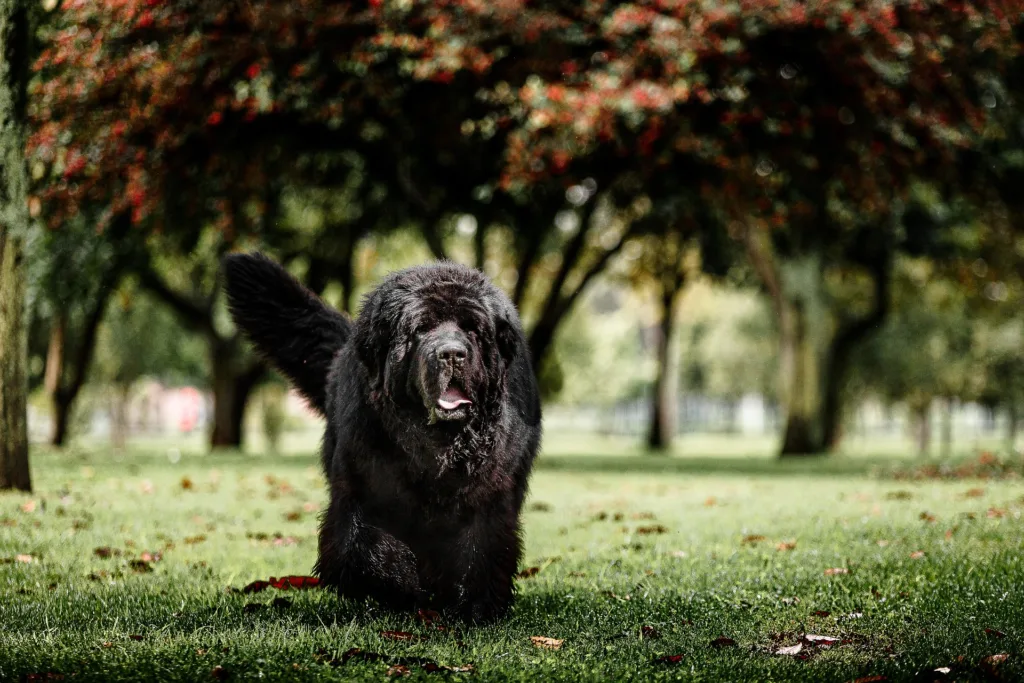
While Newfoundland dogs are better suited to cooler climates, they can adapt to warmer temperatures with proper care and precautions. Providing them with ample shade and fresh water and avoiding excessive heat exposure is essential.
Q31: Do Newfoundland dogs require regular exercise?
Newfoundland dogs are a moderate-energy breed, and regular exercise is important to keep them healthy and mentally stimulated. Daily walks, swimming sessions, and interactive playtime are recommended to meet their exercise needs.
Q32: Are Newfoundland dogs prone to barking excessively?
Newfoundland dogs are generally not prone to excessive barking. They tend to be calm and docile, barking only when necessary, such as alerting their owners to threats or expressing their needs.
Q33: Can Newfoundland dogs be trained for therapy work?
Newfoundland dogs possess the right temperament for therapy work and can be trained to provide emotional support and comfort. Their calm and gentle nature makes them suitable candidates for therapy dog training programs.
Q34: Do Newfoundland dogs require professional grooming?
While regular brushing is essential to maintain a Newfoundland dog’s coat health, professional grooming is not always necessary. However, some owners may opt for professional grooming to ensure their dog’s coat is properly maintained and trimmed.
Q35: Can Newfoundland dogs coexist with cats?
Newfoundlands can generally coexist well with cats, especially if introduced to them at a young age and properly socialized. Supervision and gradual introductions are important to ensure a positive relationship between a Newfoundland and a cat.

Q36: Are Newfoundland dogs prone to joint problems?
Like many large breeds, Newfoundland dogs are prone to problems such as hip and elbow dysplasia. Responsible breeding practices, including health screenings and selecting dogs from reputable breeders, can help reduce the risk of these issues.
7 Newfoundland and Labrador Travel Guides
- A Guide to Experiencing the Thrills of Newfoundland Whale Watching Season
- How To Best Experience Newfoundland Whale Watching Season
- How to Discover Icebergs in Newfoundland
- Where Big icebergs off the coast of Newfoundland come from
- How To Experience 500,000 Colorful Puffins in Newfoundland
- How To See Both Whales and Puffins in Newfoundland
- How to Best Enjoy Whale Watching in Newfoundland and Labrador
Q37: Can Newfoundland dogs be aggressive?
Newfoundland dogs are not typically an aggressive breed. They are known for their gentle and friendly nature. However, like any dog, individual temperament can vary, and early socialization and training are important to shape their behaviour.
Q38: Are Newfoundland dogs good with strangers?
Newfoundland dogs are generally friendly and approachable, making them good with strangers. However, early socialization is crucial to ensure they are well-adjusted and comfortable in various social situations.
Q39: Can Newfoundland dogs be trained to pull carts?
Newfoundlands have a history of working and can be trained to pull carts. They have the size and strength required for such tasks and often enjoy participating in cart-pulling activities.
Q40: Can Newfoundland dogs be left alone with children?
Newfoundland dogs are generally good with children and can be left alone. However, supervision is always recommended, especially with younger children, to ensure the safety of both the dog and the child.
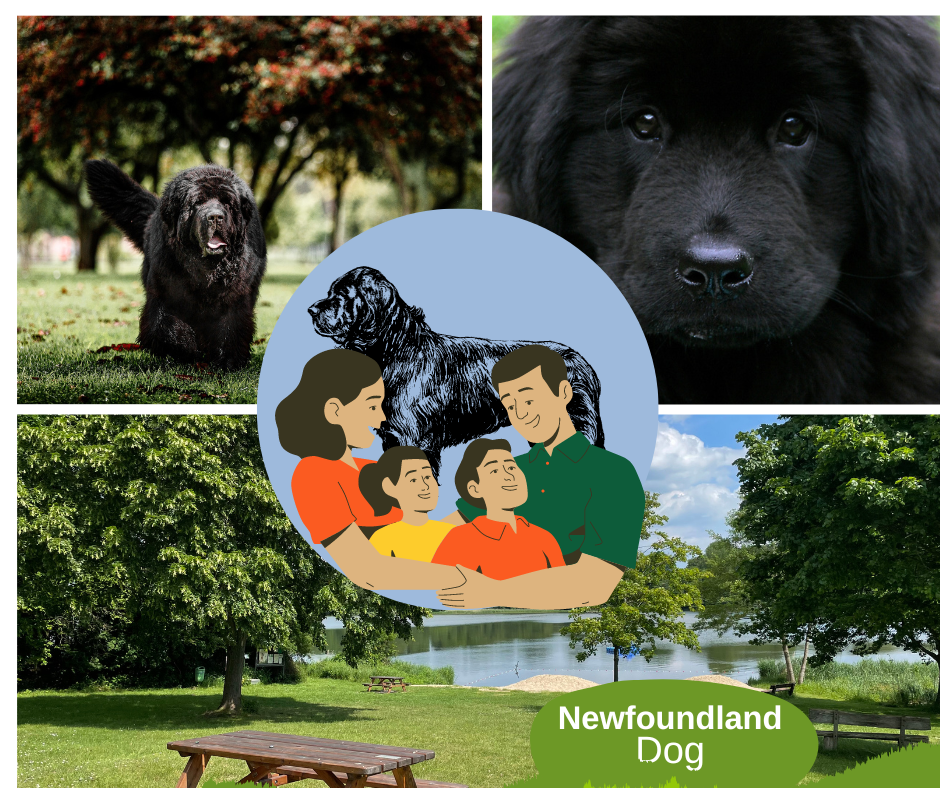
Q41: Do Newfoundland dogs require a lot of attention?
Newfoundland dogs thrive on attention and human companionship. They are family-oriented and enjoy being part of daily activities. Regular interaction, exercise, and quality time with their owners are important for their overall well-being.
Q42: Can Newfoundland dogs be trained for obedience competitions?
Newfoundland dogs can be trained for obedience competitions, and their intelligence and eagerness to please make them suitable candidates. Consistent training methods, positive reinforcement, and early socialization are key to their success in obedience training.
Q43: Are Newfoundland dogs good for novice dog owners?
Newfoundland dogs can be suitable for novice dog owners committed to providing them with the necessary care and training. It is important to research the breed thoroughly, seek guidance, and be prepared for the responsibilities of owning a large dog.
Q44: Do Newfoundland dogs require a fenced yard?
While a fenced yard is not an absolute requirement for owning a Newfoundland dog, it is highly beneficial due to its size and exercise needs. Having a secure space where they can roam and play safely is recommended.
Q45: Can Newfoundland dogs be left alone with other pets?
Newfoundland dogs can coexist well with other pets if properly introduced and socialized. However, it is always important to supervise interactions initially and ensure that all animals feel comfortable and safe in each other’s presence.
Q46: Are Newfoundland dogs good with small children?
Newfoundland dogs are generally very gentle and patient with small children. However, their large size makes supervision necessary to prevent accidental knocks or injuries. Children should be taught how to interact respectfully with Newfoundland dogs.
Q47: Can Newfoundland dogs be aggressive towards other dogs?
Newfoundland dogs are not typically aggressive toward other dogs. They tend to be friendly and tolerant. However, early socialization and proper introductions are important to ensure positive interactions with other dogs.
Q48: Are Newfoundland dogs hypoallergenic?
No, Newfoundland dogs are not hypoallergenic. They have a double coat that sheds, triggering allergies in sensitive individuals. Regular grooming and vacuuming help minimize the amount of loose hair in the environment.
Yes, Newfoundland dogs are moderate to heavy shedders. Their thick double coat sheds seasonally, with more significant shedding occurring in the spring and fall. Regular brushing can help manage the shedding and keep their coat healthy. Try the Maxpower Planet Pet Grooming Brush – Double-Sided Shedding and Dematting Undercoat Rake Comb for Dogs.
Q49: Can Newfoundland dogs be left alone for an entire workday?
Newfoundland dogs are social dogs and can suffer separation anxiety if left by themself for long periods. If you need to leave them alone for an entire workday, it is recommended to provide them with mental stimulation and toys and consider hiring a dog walker or pet sitter.
Q50: Can Newfoundland dogs live with other dogs of the same breed?
Newfoundland dog generally gets along well with other dogs, including those of the same breed. They tend to have a friendly and easygoing nature. Proper introductions and gradual integration into the household are important for harmonious coexistence.
Newfoundland dogs are remarkable companions known for their gentle nature, loyalty, and exceptional swimming abilities. Their massive size and kind disposition have captured the hearts of many dog lovers worldwide. Whether working dogs, therapy dogs, or loving family pets, Newfoundland dogs continue to impress and inspire. By understanding their unique characteristics and providing them with the care they need, we can ensure a fulfilling and harmonious relationship with these fantastic creatures.
These are the best travel planning resources you should use.
Looking to book your trip to Newfoundland and Labrador? Use these resources that are tried and tested by other travellers like you who vacation in Newfoundland and Labrador. Bookmark these links. Save them for future reference.
Booking Flights, Hotels or B&B: Start planning your next vacation trip by finding the best flight, hotel or b&b deals. Book Here
Finding things to do in Newfoundland and Labrador on TripAdvisor and Viator is not hard. Enjoy boat tours, whale watching, icebergs watching, kayaking and other activities.
You can also find low prices on hotels, B&B and cabins with these two providers. If you are located in Canada, the USA, the UK or Europe, use Booking.com, and if you are in Canada, the USA or anywhere else, use TripAdvisor.
Car Rental: Here is what we recommend:
When you book with Rentalcars.com, you can compare prices and find the best vehicle for your trip. Economybookings.com Display all their vehicle on the website with a detailed description. They display high-quality photos and a user rating as well. Qeeq.com serves road trip travellers like you from different countries by working with car rental companies worldwide.
Get compensated if your flight is delayed or cancel
AirHelp and Compensateair will help you with flight delays, cancellations, or denied boarding. All you need to do is to submit your flight details, and they will handle the claim process on your behalf. They will handle all the paperwork, airline negotiations, and legal proceedings.
Do you need more help planning your trip?
Check out our Resources Page, where we highlight all the resources and companies you can use to assist with your planning.


